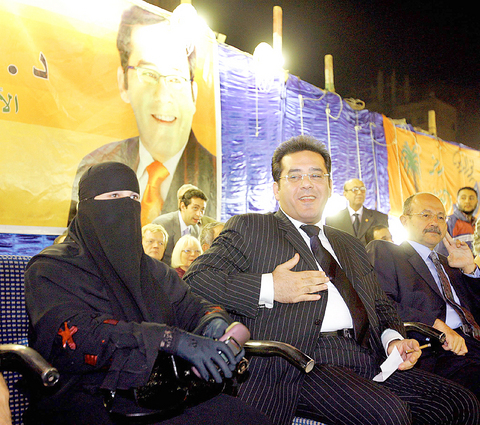Dove or tank? Tennis racket or mobile phone? In Egypt, where close to half of the population is believed to be illiterate, a good choice of campaign symbol can be decisive on polling day.
The ruling National Democratic Party (NDP) of President Hosni Mubarak makes no mistake and systematically reserves itself the Islamic crescent and the camel, which have proved their vote-grabbing potential over the years.
But the pecking order ends with the all-powerful NDP, leaving other candidates scrambling for the best remaining symbols.

PHOTO: EPA
In Cairo's impoverished Bulaq Dakrur constituency, the camel and the crescent will face a stiff challenge from the umbrella and the open book, logos for the Muslim Brothers and the hardline Gamaa Islamiya respectively.
"It's easier to remember the symbols than the names of the candidates," said Rasha Mohammed Ali.
No fewer than 529 candidates will battle it out today in the 25 constituencies of the Egyptian capital, one of eight governorates to be decided in the first wave of polling.
A total of 5,310 candidates nationwide are competing for parliament's 444 available seats during elections staggered over a whole month.
As he stares at the patchwork of posters plastered on the walls on Cairo's Dokki neighborhood, Mohammed Badri Abdallah offers his own explanation for the use of campaign symbols.
"These little logos were introduced for women, who often can't read," he said. According to most estimates, illiteracy rates hover above 40 percent for Egyptian men and reach the 50 percent mark for women.
The forest of campaign banners and posters mingling with decorations for the holy Muslim month of Ramadan and clusters of electricity cables and phone lines above Cairo's sandy alleyways can be overwhelming even to the literate.
Thus a distinctive symbol, whether representative or not of the party's platform or the candidate's profile, can be a serious asset.
On election day, some voters will tick off the symbol they can identify or simply their favorite logo rather than a name they can't read.
The determining factor in selecting a symbol often remains mysterious.
A female lawyer running in the central district of Dokki chose a cup, while others opted for the walking stick, the Ramadan lantern, the pencil or the rababa, a traditional Egyptian string instrument.
Nature-related symbols are considered safe choices, with doves, palm trees, grapes and suns among the most sought-after campaign logos.
Some would-be members of parliament wishing to convey a more modern image chose the light bulb, the aircraft and the mobile phone, while candidates in a more bellicose mood decided to run under the symbol of the tank, the sword or the handgun.
Independent candidate Adel Abdu is a contender for the prize of the healthiest symbol with a tennis racket, although courts are few and far between his destitute industrial neighborhood of Shubra al-Khima.
The Muslim Brotherhood, Egypt's largest opposition force which has promised to mount a tough challenge to the ruling party in the elections, has no symbol strategy and leaves each candidate to make his pick.

Yemen’s separatist leader has vowed to keep working for an independent state in the country’s south, in his first social media post since he disappeared earlier this month after his group briefly seized swathes of territory. Aidarous al-Zubaidi’s United Arab Emirates (UAE)-backed Southern Transitional Council (STC) forces last month captured two Yemeni provinces in an offensive that was rolled back by Saudi strikes and Riyadh’s allied forces on the ground. Al-Zubaidi then disappeared after he failed to board a flight to Riyadh for talks earlier this month, with Saudi Arabia accusing him of fleeing to Abu Dhabi, while supporters insisted he was

The Chinese Embassy in Manila yesterday said it has filed a diplomatic protest against a Philippine Coast Guard spokesman over a social media post that included cartoonish images of Chinese President Xi Jinping (習近平). Philippine Coast Guard spokesman Jay Tarriela and an embassy official had been trading barbs since last week over issues concerning the disputed South China Sea. The crucial waterway, which Beijing claims historic rights to despite an international ruling that its assertion has no legal basis, has been the site of repeated clashes between Chinese and Philippine vessels. Tarriela’s Facebook post on Wednesday included a photo of him giving a

‘MOBILIZED’: While protesters countered ICE agents, Minnesota Governor Tim Walz activated the state’s National Guard to ‘support the rights of Minnesotans’ to assemble Hundreds of counterprotesters drowned out a far-right activist’s attempt to hold a small rally in support of US President Donald Trump’s latest immigration crackdown in Minneapolis, Minnesota, on Saturday, as the governor’s office announced that National Guard troops were mobilized and ready to assist law enforcement, although not yet deployed to city streets. There have been protests every day since the US Department of Homeland Security (DHS) ramped up immigration enforcement in the Twin Cities of Minneapolis and Saint Paul by bringing in more than 2,000 federal officers. Conservative influencer Jake Lang organized an anti-Islam, anti-Somali and pro-US Immigration and Customs Enforcement

NASA on Saturday rolled out its towering Space Launch System (SLS) rocket and Orion spacecraft as it began preparations for its first crewed mission to the Moon in more than 50 years. The maneuver, which takes up to 12 hours, would allow the US space agency to begin a string of tests for the Artemis 2 mission, which could blast off as early as Feb. 6. The immense orange and white SLS rocket, and the Orion vessel were slowly wheeled out of the Vehicle Assembly Building at the Kennedy Space Center in Florida, and painstakingly moved 6.5km to Launch Pad 39B. If the